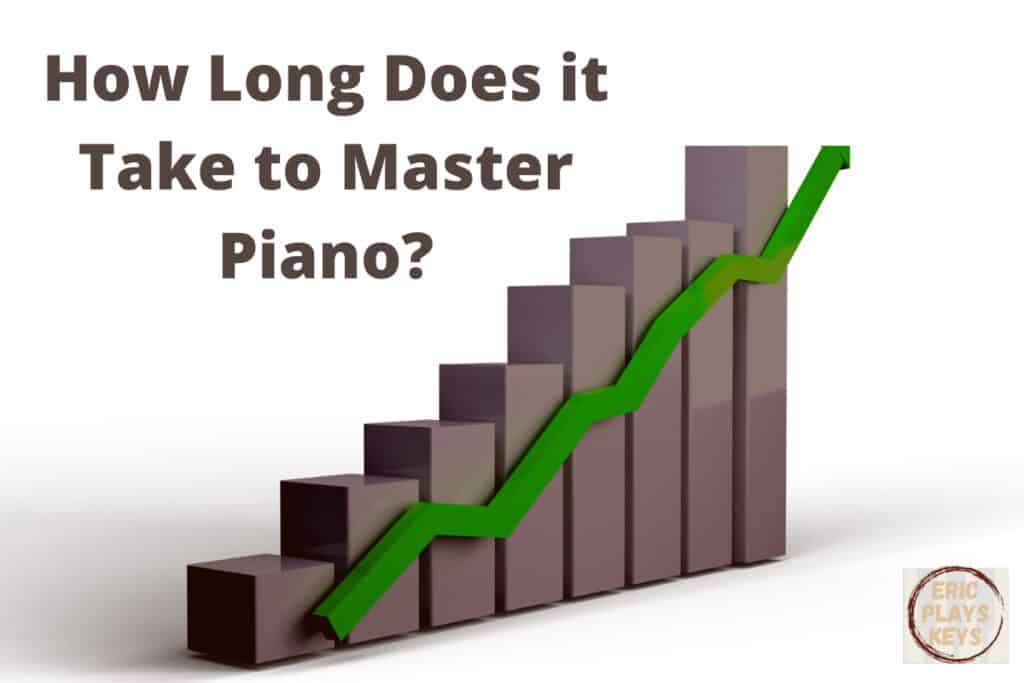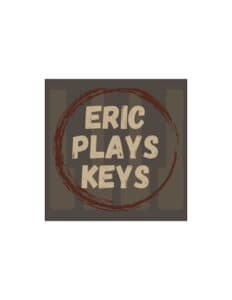
This is a question a lot of people ask when starting to learn piano. Young musicians want to know what they are singing themselves up for, and how long it will take to play at the highest level. I’ve watched many musicians progress towards mastery over many years, and will go into the average timelines I’ve seen here.
It takes between 10 and 20 years of consistent practice to master piano. The genre of music, age of the player, and natural talent may influence this duration. It is also important to note that ‘mastering’ piano is subjective, and the timeframe provided here may differ from other sources.
There’s a lot to unpack here. In this article I’ll go further into this timeline, how difficult the journey can be, and the timeline difference between getting ‘good’ versus ‘mastering’ piano.
Mastering Piano Takes Many, Many Years
No matter what the situation is – how much talent the player has, the quality of the lessons and teachers, the encouragement from parents, and more – it is going to take any player at least 10 years of consistent practice to master piano.
‘Mastering’ piano is subjective, but I’ll use a reasonable definition: a player has mastered piano when they can play the most difficult pieces or songs in a way that other musicians would enjoy. In other words – if a classical pianist has can captivate an audience of other classical pianists, then it’s safe to say they are a master.
This can apply to other genres of music as well – they may have different timelines for long it takes, but the principle stays the same. It would likely take 10 years minimum to learn rock piano to the point that you can entertain other rock musicians. Same goes for jazz, R&B, etc.
I’d say 10 years is definitely on the lower side, however. Ten years from complete beginner to master is very quick, and for most musicians it will take more. For most musicians, there are times that their practice routine isn’t perfect, times they’ve been distracted, times that life gets in the way, etc. This is totally ok, and usually results in slightly slower progress.
Talent level will influence the timeline as well. Although I strongly feel that anyone who loves learning and loves music has the necessary talent to learn piano, there’s still levels. Take Joey Alexander, who mastered jazz piano before the age of 10 for example. I’m sure he worked very hard, but there’s no denying that a huge amount natural ability accelerated his timeline.
Age can matter as well. If you start very young, you have the advantage of learning while your brain is more plastic. This is the same thing that allows young children to learn languages much more easily than adults. On the other hand, young children are much more distractible and sometimes less motivated to practice than adults. This balances out somewhat, but I’d say that starting as a child accelerates your journey to mastery on average.
For more information on how to progress towards mastery of piano, check out my definitive guide.
How Hard is it to Master Piano?
Mastering piano is very difficult, as it requires consistent practice for many years. It also requires commitment and grit for the musician to focus on their shortcomings and weaknesses in order to improve.
Just because the timeline is around 10-20 years does not mean that every player will accomplish mastery within that time, or at all. This timeline assumes the player is consistently practicing, and working on the right things. Some players will practice occasionally, and mess around during their practice sessions. Those players will improve, but likely won’t ever achieve mastery.
As far as consistency goes – mastering piano likely requires high quality practice most days. It’s allowable to take one or two days off per week, so players must maintain motivation to practice 5-7 days per week for 10-20 years. This is no small feat, and it’s very likely there will be times that life gets in the way. A high amount of accountability is required to get back on track to this practice schedule after periodic digressions.
Another thing that is absolutely necessary for mastering piano is practicing the right things. What are the right things you ask? Fundamentally, a pianist who practices the right things is attacking their weaknesses, whatever they may be. This means avoiding practicing material the player is already good at, or already sounds good at.
Focusing on practicing a player’s strengths isn’t bad per se, but can often distract the player from working on their shortcomings. In my experience, this is because it’s a lot more fun to practice what you’re good at – it sounds and feels better. When focusing on your shortcomings, it’s very difficult, doesn’t sound good, and much more mentally tiring.
Forcing myself to focus on songs, technique, passages, and other material that I’m not good at yet is probably the most challenging thing I deal with in getting better. Masters of piano must repeatedly get past this barrier, close to daily, for many years. This is another reason why it is quite difficult to get to this level of playing.
For more information on the qualities of a master piano player, check out this article.
How Hard is It to Get Good at Piano?
It is reasonably easy to get good at piano, requiring 2-5 years of somewhat consistent practice. It requires some concentration and accountability to work on challenging material, although perfection is not necessary.
The difference between ‘learning to play piano’, being ‘good’ at piano and ‘mastering’ piano is huge. Learning piano is the first step, and I wrote an article about the moderate challenges associated with early stages. What I mean by being good at piano is that you can play some songs convincingly enough for others to recognize. While I defined ‘mastery’ as the ability to captivate other high level musicians, I’ll define ‘being good’ as the ability to captivate a general audience.
The bar is not super high here – you don’t need to play anything perfectly, you don’t need to have complete control. All you need to do is comfortably get through the songs and material you’re playing, and it will sound decent to most people! There’s absolutely nothing wrong with getting to this level and deciding you don’t need to continue improving. At this level you can entertain others and enjoy yourself.
It shouldn’t be too hard to get to this level – you’ll need to practice somewhat regularly for a couple years. It may take 1-2 years to learn your fundamentals, and another couple years to learn your songs and/or pieces of choice. You won’t need to drill yourself over and over again to perfect every note, and can move on once you’ve gotten most of the notes and passages to your liking.
Managing your motivation levels shouldn’t be too much of an issue here – it’s totally acceptable to take a couple days break regularly if you don’t feel like practicing and still get decent at playing in about 4-5 years.
